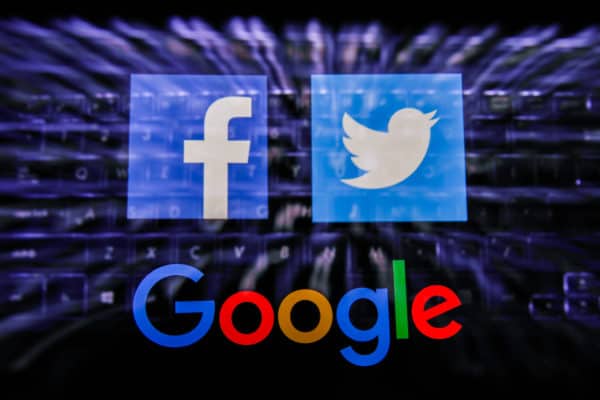New Combatants in the Fight Against Big Tech
Chris Roberts, American Renaissance, August 22, 2020

Credit Image: © Jakub Porzycki / NurPhoto via ZUMA Press)
Big Tech censorship is one of the biggest obstacles to spreading the truth. Unfortunately, it has been hard to fight.
- Jared Taylor took Twitter to court after they suspended his personal account and the American Renaissance account, but nothing came of it.
- Representative Tulsi Gabbard sued Google last summer after they mysteriously suspended her presidential campaign’s advertising account shortly after a Democrat candidate debate she did well in. Early this year, the suit was dismissed by a Federal court.
- Dennis Prager of “Prager University” sued Google and YouTube (which are owned by the same company, Alphabet Inc.) for their bias against conservatives. The courts dismissed this suit as well.
Meanwhile, the censorship alleged in these suits has only gotten worse. Both Breitbart and AmRen have seen their traffic from Google searches plummet over the last five years. Since June, Twitter has permanently banned many users with large followings, ranging from outright racialists to libertarians. To name a few: David Duke, Ashley “Communism Kills” Goldenberg, Bill Mitchell, and Stefan Molyneux. YouTube purged many dissident channels around the same time, including VDARE’s and AmRen’s. For its part, Facebook censored an article from the American Thinker for the first time earlier this month, and no longer allows links to Counter-Currents appear on its website.
Counter-Currents articles can no longer be shared on Facebook or in Messenger. And all older links have been deleted. Welcome to totalitarianism.
— John Morgan (@licht_alberich) August 15, 2020
Big Tech is shrinking the circle of permissible thought, and so far, legal action by political outsiders has been unsuccessful. So it comes as excellent news that Google and Apple are now facing pushback from apolitical entities. Earlier this month, YouTube removed all Danish music from the Danish version of its website “following failed negotiations on copyright with music licensing organisation Koda.” The Danish Minister of Culture denounced this move, saying:
It is a huge challenge for the distribution of Danish music that a dominant platform such as YouTube (Google) removes Danish titles from the platform due to a conflict of rights . . . Google also owes it to clarify on how and how much artists are paid and what they will do to ensure rights and a fair settlement . . .
The government is seeking talks with Google to discuss its “role in the Danish market.”
Additionally, Epic Games , is suing Google and Apple for removing the video game Fortnite from its app stores. Here’s the New York Times’ summary:
Epic Games, the maker of Fortnite, started encouraging Fortnite’s mobile-app users to pay it directly, rather than through Apple or Google. The companies require that they handle all such app payments, so they can collect a 30 percent commission, a policy that has been at the center of antitrust complaints against the companies.
Hours later, Apple responded, removing the Fortnite app from its App Store.
Within an hour, Epic . . . sued Apple in federal court, accusing the company of violating antitrust laws by forcing developers to use its payment systems. . . .
Later on Thursday, Google also removed the Fortnite app from its official Android app store, the Google Play Store, saying the app violated Google’s policies. Epic replied with a similar lawsuit.
Fortnite is one of the most popular video games of all time, with hundreds of millions of users around the world. This will make many people sympathetic to Epic Games, and its focus on antitrust laws will earn it sympathy from the Left — which wasn’t the case when AmRen and PragerU took their complaints to court.
The bias against white advocates and even populist/nationalist conservatives is so strong that we may not be able to successfully challenge much of anything through the legal system. However, we are not the only ones who lose out when the whole internet is all but owned by a handful of companies. Big Tech is much more likely to lose a legal battle against a wildly popular video game company than against Jared Taylor. Likewise, a national government is much more likely to convince a corporation to change its censorious policies than a staff writer at Breitbart. Any “busting” of these monopolies will benefit American Renaissance and our confederates. Three cheers for Epic Games and Denmark.
















